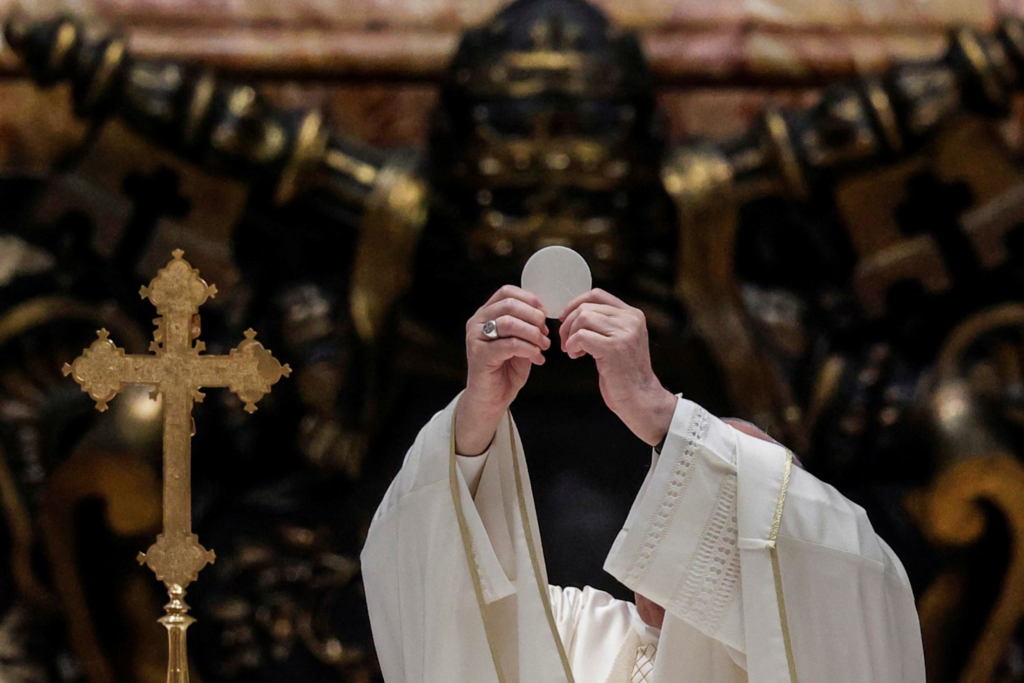The United States Conference of Catholic Bishops Responds to Public Inquiry over Eucharist Document

Image Courtesy of The Catholic News Service
By Anna Harvey
The United States Conference of Catholic Bishops’ (USCCB) Spring General Assembly covered a multitude of topics, from the causes of beatification and sanctification of saints to the translation of liturgical documents for the Church in Latin America. None of these topics, however, was as thoroughly discussed and reported by the mainstream news as the USCCB’s action item to task the Committee on Doctrine to draft a formal statement “on the meaning of the Eucharist in the life of the Church.”
After the Assembly, interpretations arose that the bishops were retaliating against President Joe Biden and other pro-choice, yet baptized, Catholic politicians who receive Holy Communion. The USCCB corrected, however, that the document is not in response to recent events. In the days following, the USCCB posted a Q&A document to their website, which addressed recent events and news reports concerning the Eucharist document.
“The question of whether or not to deny any individual or groups Holy Communion was not on the ballot. The vote by the bishops last week tasked the U.S. Conference of Catholic Bishops’ Committee on Doctrine to begin the drafting of a teaching document on the Eucharist,” the Q&A said.
Multiple mainstream sources stated that prior to the Spring General Assembly, the Vatican reprimanded the USCCB to not prohibit Biden from receiving the Eucharist.
“The document being drafted is not meant to be disciplinary in nature, nor is it targeted at any one individual or class of persons,” the Q&A said. “It will include a section on the Church’s teaching on the responsibility of every Catholic, including bishops, to live in accordance with the truth, goodness and beauty of the Eucharist we celebrate.”
Moreover, the Q&A document addressed claims that the Vatican had specifically instructed the USCCB to not prohibit the president from receiving the Eucharist.
“The Holy See did encourage the bishops to engage in dialogue and broad consultation,” the document said. “Last week’s meeting was the first part of that process. It is important to note that collaboration and consultation among the bishops will be key in the drafting of this document.”
Earlier in March of 2021, the President of the USCCB, Archbishop José Gomez, wrote to the Vatican to inform that the US bishops would gather to discuss the situation of Catholic pro-choice politicans who attend Mass and receive the Eucharist.
In response, Cardinal Luis F. Ladaria, prefect of the Vatican’s Congregation for the Doctrine of the Faith, likewise sent a letter advising the US bishops how to proceed. The letter did not specify specific political figures, but rather recalled a similar scenario in the early 2000s, in which Cardinal Ratzinger—who later was elected Pope Benedict XVI—wrote a letter likewise concerning proper reception of the Eucharist.
“During the 2004 ad limina visits to which he refers in his letter, questions arose on several occasions concerning the reception of Holy Communion by Catholic politicians who supported the so-called ‘right to choose’ an abortion,” Ladaria’s letter said. “…At that time, the development of a national policy was not under consideration, and Cardinal Ratzinger offered general principles on the worthy reception of Holy Communion in order to assist local ordinaries in the United States in their dealings with Catholic pro-choice politicians within their jurisdictions.”
The letter continued to explain that, given the historic controversial nature of developing a document on the subject, the Conference ought to delicately establish a framework for implementing a document on proper reception of the Eucharist. The proceedings would require the Conference to agree as a whole that any Catholic individual in a lawmaking body must oppose any law “that attacks human life.” The bishops would consequently reach out through their ordinaries to Catholic pro-choice politicians to initiate a dialogue on the practice of Catholic teaching in public office.
“Once these two stages of extensive and serene dialogue have taken place, the Conference would face the difficult task of discerning the best way forward for the Church in the United States to witness the grave moral responsibility of Catholic public officials to protect human life at all stages,” the letter said.
In particular, Ladaria specified that this message ought to be dispensed to the entire Catholic population in the US.
“Furthermore, the Congregation advises that any statement of the Conference regarding Catholic political leaders would best be framed within the broad context of worthiness for the reception of Holy Communion on the part of all the faithful, rather than only one category of Catholics, reflecting on their obligation to conform their lives to the entire Gospel of Jesus Christ as they prepare to receive the sacrament,” the letter said.
After receiving Ladaria’s letter, Gomez announced that the USCCB would heed the Congregation’s advice.
He said that the prefect “has provided us with important background and insight that should prove helpful to us in our continued prayer and discernment of this matter.”
During the General Assembly, of the bishops who voted, 168, or nearly three-fourths, voted in favor of drafting a formal document on “the meaning of the Eucharist in the life of the Church,” while fifty-five bishops, less than one-quarter, voted against the motion. Six bishops abstained from voting. Following the Assembly, Bishops clarified that the document on the Eucharist would not create a national policy.
In the weeks following, numerous Catholic pro-choice politicians spoke out against the USCCB in an interpretation that the proposed document would be levelled at them. 60 Catholic House Democrats released a “statement of principles.”
Accordingly, the USCCB’s Q&A document answered the politicians’ claims.
“There will be no national policy on withholding Communion from politicians,” the document stated. “The intent is to present a clear understanding of the Church’s teachings to bring heightened awareness among the faithful of how the Eucharist can transform our lives and bring us closer to our creator and the life he wants for us.”
In the weeks following the General Assembly, multiple news sources, most prominently The New York Times, but also The Wall Street Journal, The Washington Post, NPR, and CNN reported that the Vatican had “rebuked” the USCCB, or that the Conference was “targeting Biden.”
“Media outlets like The New York Times, CNN and NPR framed the vote as ‘targeting Biden,’ a ‘potential rebuke’ of the president, and a vote to ‘rethink Communion rules,’” reported the National Catholic Register. “The New York Times also framed it as a ‘divergence’ from Pope Francis, claiming the U.S. bishops ‘flouted’ a ‘remarkably explicit letter from the Vatican in May urging it to avoid the vote,’ in reference to the letter from Cardinal Ladaria.”
Earlier, bishops at the General Assembly expressed concern over potential interpretations of the document. Cardinal Blase Cupich of Chicago stated concerns that the document would be interpreted solely in a political light.
“I don’t know how we get around that, if we pass on this document,” he said.
Bishop Kevin Rhoades of Fort Wayne-South Bend in a post-Council interview with Our Sunday Visitor, likewise expressed disappointment with politicians’ and the media’s portrayal of the document on the Eucharist.
“I am disappointed in that erroneous interpretation,” Rhoades said. “As bishops, we are committed to teaching in communion with the pope. As I mentioned, we will be in consultation with the Vatican Congregation for the Doctrine of the Faith during this process since this will be a teaching document on the Eucharist. I am grateful for the letter Archbishop Gomez received from Cardinal Ladaria emphasizing dialogue and unity among the bishops. We are preparing a doctrinal reflection and not drawing up national norms, since such would be beyond the competency of our committee.”
The USCCB will meet again in November to oversee the document draft.
“The Eucharist is the heart of the Church and the heart of our lives as Catholics,” Gomez said. “I invite everyone in the Church to pray for the bishops as we continue our dialogues and reflections. I pray that this will be a time for all of us in the Church to reflect on our own faith and readiness to receive our Lord in the Holy Eucharist.”






